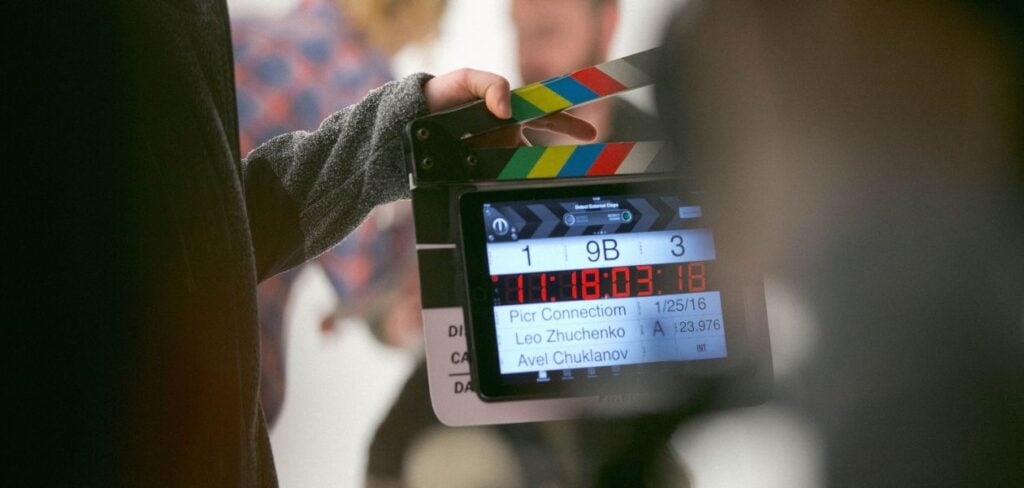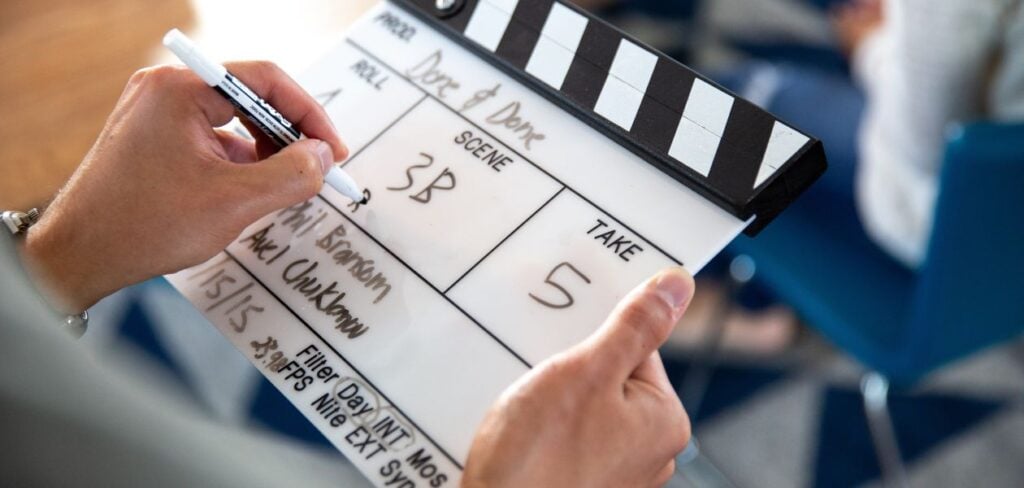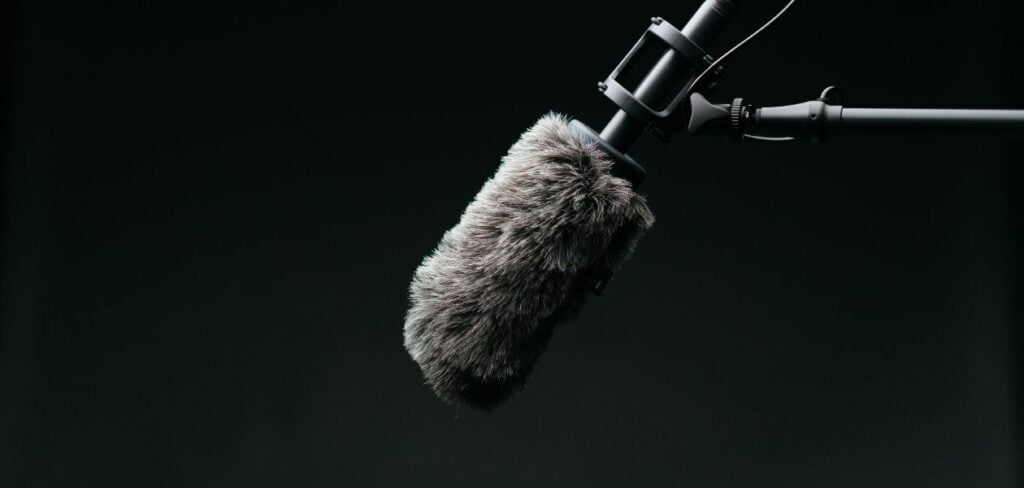
Film Set Etiquette
The morning has finally arrived!
You get up at the nasty time of 4am, down that cold coffee you tactfully left beside your bed last night and jump in the shower. After spending way too much time choosing what to wear (which you should have done the night before), you pick something and freshen up to look your best. In the car, you get a little nervous for the day ahead, but you decide to flick on the latest “An Actor Survives” podcast that features that guy from Stage Milk, just to get in the head space for what’s to come. After much deliberation, you arrive at the film set. A sacred place.
It’s where the magic happens, after all. A little knot appears in your stomach. Excitement, perhaps? Or fear? Most likely a bit of both. You walk on set expecting other tired souls, but you’re wrong: the place is alive! There’s a buzz in the air as all sorts of people run around or pace with urgency. You try to stop someone and ask where to go; they vaguely point in some direction without breaking their stride. Lucky for you, someone notices this lost soul wandering around on set. You feel a wave of gratitude as they lead you to where you have to be. You let out a sigh of relief. “Phew!” you think to yourself … followed by “What do I do now?”
Well, that’s easy. I’ll run you through it.

On Set Chaos
Within the first twenty minutes of my first day on a feature film I got lost, met Dwayne “The Rock” Johnson, tripped over cords and got yelled at for coming back to set without the coffee order (even though I explained several times that, no, my name is not Jared and no, I don’t know anything but your caramel-pumpkin-spiced atrocity you call coffee. Wow). This sounds like a tall tale, but this literally was it.
It was the first time I saw a big film set up close and I was lucky enough to be a body double on a feature film for three months. Some of this might sound like a brag, but I promise you it is not: how I survived without getting into too much trouble, embarrassing myself too much or getting fired, was simply due to my common sense.
Being on a film set can be hard at times, and confusing, and whether you like it or not you’ll probably make a mistake or two. That’s the bad news. Good news is that in the next few sections, you’re going to learn from my own (and others’) many mistakes, so you don’t have to make them yourself.
To Do or Not To Do?
How exactly to behave on set will depend on what role you have on it. For example a director is going to have infinitely more freedom (and responsibility) than an extra, who will have a very different role to an AD who will have a different role to, well, you get the point. However, for the sake of scope in this article, let’s say you are not the director for a large feature film and are either an actor, extra, or body double. Although I like to think this could serve anyone on set.
Let’s dive in to the do’s and do nots:
How to Behave on Set
1. Learn Everyone’s Name
This is especially important if you are on set often, or contracted for multiple months. It’s one of those common-sense points that sounds painfully obvious, but you will be shocked just how often people don’t bother to remember the names of crew and extras. So it’s particularly nice when someone does take the effort. On the flip-side of this, don’t be offended if someone does forget your name. There are hundreds of people on-set over the span of filming. Not everyone is going to know who you are and that’s okay. They can’t all be perfect like you!
2. Be On Time

Once again, this sounds like common sense, but here we are. You are but one part of a huge, busy machine. If you are not there when you are needed, the best case scenario is that they will move on with out you. The worst? They do wait for you, costing them time and money and ensuring that an entire crew of 100+ people will never want to deal with you again.
There’s a delicate time crunch that is apparent on every single set you will ever find yourself on. Arguably, this crunch contributes to the vitality of a film set—keeping the action feeling static despite the actors having to do the same scene over and over.
Also, before you start thinking of a good reason that you might be late (why are you still running late?!), know that it doesn’t matter. Sorry to be blunt, but nobody cares. Traffic was bad? You shoulda left earlier. Car wouldn’t start? Still not their problem. Train was late? You had a headache? Your dog ate your homework? Some people say: “I always end up sitting around on set for hours after I arrive, anyway!” Frustrating, sure. But still not a valid excuse.
It is always regrettable to be late. No one ever regrets being early to set. Do your future self a favour and banish the snooze button. Oh, and remember: being on time means arriving early, arriving on time is being late.
3. Respect Everybody. Always. Forever.
I’m not going to lie, this is just great life advice! But I will narrow it down to film sets.
Overall, before you make your way on set, ask yourself the question: “How do I want these people to remember me, and what kind of vibe do I want to give?”
It’s easy to build an ego as you start getting more roles and move your way up the proverbial acting ladder. However, this doesn’t make you better than everyone—arguably anyone. I have seen it happen and it is not a good look.
Everyone on set is important in their own way: no more than you, no less than you. Don’t let your success go to your head. Also: never forget that people talk. If you decide to be rude to a PA when no one is around, you can make a safe bet that everyone is going to know by the end of the day. Behave as if the director is always watching, because in a way, they are. It’s cool to be kind.
4. Be Awesome To Work With
Shocking. I know, but it’s true. People who are awesome to work with get called back for more work. They are also the people who get promoted on set when a larger role becomes free or opens up. How do you do that? Well, following this article is a good place to start! On top of that it’s just about being a friendly, kind and personable.
Bettering your social skills is a great place to start. Being approachable and connected to those around you: present. Be open to a chat on set (when appropriate) instead of scrolling on your phone for half the day. Social skills are just that: skills. They can be learned and improved.

The To Not To Do’s
1. NEVER Complain
See how I put “never” in caps? For Real. Don’t do it, homie. Do. Not. Whine.
People don’t want to hear it. At least, they don’t on set. If you had a rough day, vent about it after work, not during. This is especially true if you are an extra, body double/stand-in or yes, even an actor. Why? Because whatever “problem” you are dealing with on set is nothing compared to what the crew have had to deal with that day. You had a 6am call time? Well the crew was here at 4am. You finished late? The crew are still packing down while you’re on the train home. It’s also just not constructive. It’s not helpful to anyone, including yourself.
Now I know this is coming off a little harsh, but I am not writing this just because I don’t like negative people. I am writing this for your benefit. Complaining on set is a surefire way for you to stop getting calls to work, only to be replaced by someone else who has a better attitude. A million girls would kill for this job, so make sure you secure it by being grateful.
I am not saying that life on set will always be sunshine and roses. There will be some really hard and trying times where you will face challenges. But being grateful and having a good attitude as you face these challenges will make you feel more satisfied with your work. Embrace the challenges on set, don’t complain about them.
Of course if something happens that is actually serious, tell one of the AD’s or safety officers. Having a whinge because you had to get up at 5am that morning is very different to venting your grievances because a lighting equipment fell on your head or a cast/crew member’s conduct was inappropriate. If you are unwell, unsafe, or feel uncomfortable, talk to someone.
2. Do Not Touch Anything
If it’s not something that you brought from home, then do not touch it. Even if you are trying to be helpful. We’re all guilty of this, even me! Once, I moved an expensive-looking piece of camera equipment that looked like it was going to fall over if it stayed in its place. This resulted in a very upset crew member who could not find what they needed, which then resulted with me getting a stern talking to. Try your best to refrain from touching anything. Stay in your lane, do your job, and let others do theirs.

3. No Photos
Do not take photos on set. Not only will it be more than likely against the NDA (Non-disclosure Agreement) that you signed, it is not a good look.
Breaking an NDA will result in you getting fired on the spot, and the likelihood of you being blacklisted from future productions will be greatly increased. But you also don’t want to be known as the person who got fired on set because you decided to take a picture of Tom Hanks mid-scene. He’s at work, too. Why would you harass the Nicest Man In Hollywood?
Lastly, it makes you come across as green: a gawking amateur. If you want to take a totally cool selfie for your Myspace (or whatever people are on these days), do it before or after your shoot. Not during. You really do not want to be that person. Which brings us to…
4. Please, Do Not Ask For a Picture
I even said please, this time, because I am begging you: don’t do it. You just saw the Margot Robbie eating breakfast at base unit? Put the phone down. Actors, even famous ones, are still human beings. Respect their space, process, time and energy.
It’s also another good way to get you fired. I have seen it happen with my own eyes: somebody ran straight up to the legend himself, Dwayne “The Rock” Johnson, and asked for a selfie as he was preparing to go into a scene. Sure, he was super nice and obliged (he is that cool!) But the second they got back to their position, they were escorted off set and never heard of again. They would have lost months of work, all because they wanted a selfie.
If you do get a chance to talk to a notable actor, director, writer or what have you, ask them an interesting question instead. You will gain much more value from the experience of meeting them if you ask something like what they’re reading/what daily habit they’d recommend than asking for a picture. Again, you don’t ever want to look green. These people are your future colleagues.
5. Do Not Network
The film set is a place of work, not a networking event. Trying to hit up the director for a role whilst they are trying to work is a better way of pissing them off than getting them to hire you.
Ironically, the best way to network is by not trying to network. If you want more work, all you have to do is your job, and do it well. Be present: connect with those on set with the purpose of simply connecting.
If you talk to everyone with the hopes of “networking” and trying to make a contact, you will (with out meaning to) come across as disingenuous and desperate. Not a good reputation to have. Connections are made by being interested with the person you are talking to, rather than being interested in what they can do for you. Network by demonstrating on set that you are a professional who is easy to work with.
Above All… Be Professional

This is, once again … obvious (you thought I was going to say common sense, didn’t you?) However, what one person deems professional, another may deem appropriate behaviour. Or simply what their privilege and status allows them. All the hints, tips and tricks listed above breaks down what it means to be professional on set.
At the end of the day, you must remember that this is a job. And if you do want to have an actual career within the film and TV industry, you must treat it as such. The best way to learn this is to be on set as much as you can, which is why it is always recommended that actors start off as extras when they are trying to break into the film and TV world. Have a low-stakes job on set, which then gives you the freedom to observe and learn how the film world operates.
When in doubt and before you do anything, ask yourself these questions:
- Is this part of my job?
- Does this action help me do my job?
- Am I acting like a professional?
- Will this hinder or distract someone from their job?
- Am I being respectful right now?
It can be an uphill, hard-fought battle to even end up on a film or TV set. For many, it is a long and sought-after dream that consumes years of their professional lives. Don’t shoot yourself in the foot just as you get what you want by not having good film set etiquette. At the end of the day, people that are profession and pleasant will always get called back for work over someone who doesn’t use their common sense (actual last time, I promise).
I hope these hints, tips and tricks will serve you well on your path. And remember: stay hungry my fellow actors!

Leave a Reply